#Haradrim
Explore tagged Tumblr posts
Text
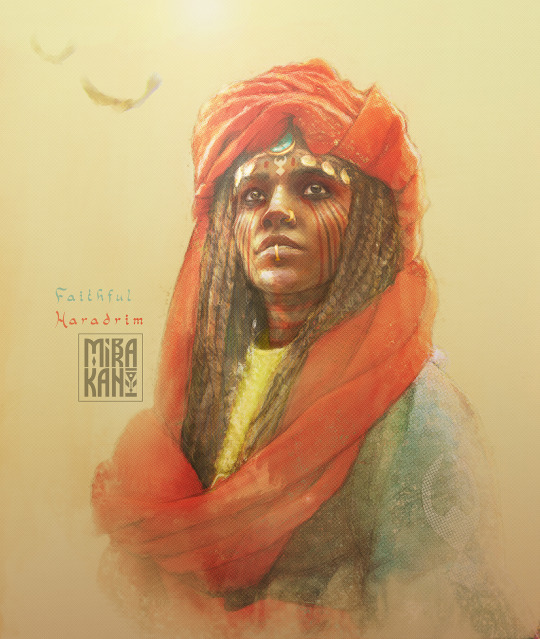
Faithful Haradrim portrait for a friend of mine.
I painted her as a part of the story she creates and she was kind enough to let me share it with you ^^
I think she's gorgeous and I gotta practice painting women more often.
@konartiste I tag you coz I promised 😁✅
#tolkien#lord of the rings#silmarillion#middle earth#lotr#tolkien art#haradrim#harad#tolkien fanart#artmirka#sil art#lotr art
635 notes
·
View notes
Text

The Blue Wizards in the Far Rhun and Harad.
These are two forgotten characters in Tolkien's world, cause he changed their destiny many times.
We Just know that they travelled to Rhun and Harad, and they tried to fight Sauron's influence in those great regions of Middle Earth.
How did their project work? Well, It isn't clear.
Maybe they failed, or they worked perfectly so not all Haradrim and Easterlings took part in The War of the Ring, or they made the same mistake of Radagast, creating some phylosophies and religions to help their regions and nothing more. Tolkien changed many times their destiny in his letters, so everyone can think what they want.
#tolkien#silmarillion#tolkien legendarium#the silmarillion#the quenta silmarillion#blue wizards#istari#haradrim#harad#rhun#easterlings#lord of the rings books#lotr imagine#silm art#fantasy art#fantasy illustration#epic fantasy#lord of the rings fanart#tolkien fanart
38 notes
·
View notes
Text

Éomer Faces the Mumakil - by Wout Art
A personal piece two years in the making, on and off. Was dissatisfied with the direction it took and left it for a year. Happy I found my inspiration again.
My favorite parts in the Lord of the Rings are probably those that speak of the Rohirrim. I love their desperate sacrifice and this part of the book, where Éomer is overcome with grief over his fallen sister Éowyn always gets to me.
---------------
An excerpt from The Return of the King, LoTR Book 5, Ch 6, The Battle of the Pelennor Fields, by J.R.R. Tolkien:
And now the fighting waxed furious on the fields of the Pelennor;... and the mûmakil were bellowing as they were goaded to war.... [The] horsemen rode eastward to the succour of Éomer: Húrin the Tall Warden of the Keys, and the Lord of Lossarnach, and Hirluin of the Green Hills, and Prince Imrahil the fair with his knights all about him.
Not too soon came their aid to the Rohirrim; for fortune had turned against Éomer, and his fury had betrayed him. The great wrath of his onset had utterly overthrown the front of his enemies, and great wedges of his Riders had passed clear through the ranks of the Southrons, discomfiting their horsemen and riding their footmen to ruin. But wherever the mûmakil came there the horses would not go, but blenched and swerved away; and the great monsters were unfought, and stood like towers of defence, and the Haradrim rallied about them. And if the Rohirrim at their onset were thrice outnumbered by the Haradrim alone, soon their case became worse; for new strength came now streaming to the field out of Osgiliath. There they had been mustered for the sack of the City and the rape of Gondor, waiting on the call of their Captain. He now was destroyed; but Gothmog the lieutenant of Morgul had flung them into the fray; Easterlings with axes, and Variags of Khand, Southrons in scarlet, and out of Far Harad black men like half-trolls with white eyes and red tongues. Some now hastened up behind the Rohirrim, others held westward to hold off the forces of Gondor and prevent their joining with Rohan.
#tolkien legendarium#jrr tolkien#mûmakil#haradrim#middle earth#the return of the king#gothmog#the rohirrim#rohirrim#riders of rohan#éowyn#éomer
20 notes
·
View notes
Text
"Harad" in the Third Age having insanely complex politics and factions... People willingly fighting on Sauron's side. People forcibly conscripted to fight on Sauron's side. People fighting against Sauron (and their own neighbours in the process). Legitimate armies resisting him, and rebel cells consisting of twenty youths with ten swords between them.
Some of the people allied with Sauron are simply evil, and others have longstanding beef with Gondor, and sometimes it's being colonized by Gondor proper, and other times it's the memory of Númenor -- who in fact acquired most of that enemity in its years of being in practice led by Sauron. Some knowing who they're ultimately allied with, others having been recruited by less scary intermediaries. And it's just such a mess.
#I write Harad in quote marks as part of my#there's no way that's the actual name#agenda -- because it feels a bit ridiculous to group such a huge number of peoples simply into the 'South'#my post#tolkien#Harad#lotr#peoples of arda#haradrim
49 notes
·
View notes
Text
Weekly Rohan poll!
#eomer#lotr fanfic#rohirrim#mumakil#haradrim#battle of the pelennor fields#lord of the rings#lotr#Rohan#lotr poll#RohanPoll
17 notes
·
View notes
Photo

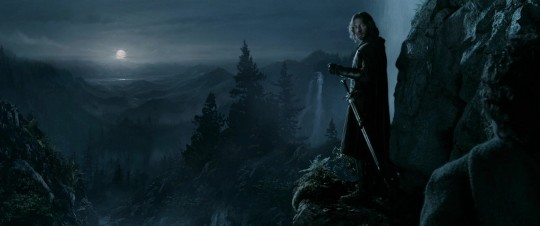




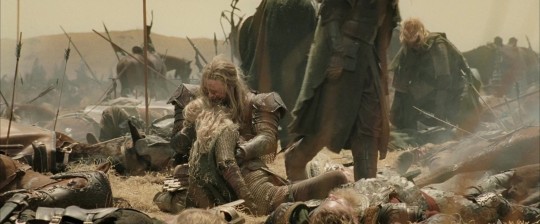
Middle-earth shots of the week
#Haradrim#Faramir#Ithilien#Frodo Baggins#Shelob#Barliman Butterbur#Galadriel#Beren#Luthien#Narsil#Gandalf#Elrond#Rivendell#Eomer#Eowyn#Lord of the Rings#Rings of Power#The Hobbit#Tolkien#Middle-earth shots
93 notes
·
View notes
Text

Haradrim Soldiers, Book vs Movie
4 notes
·
View notes
Text
12th – language/culture/beauty
Beauty in Harad
She was Hastalteth, healer. It was a title, assigned to a slave whose duty was to scour the battlefield for the fallen but not-yet-dead, and make them fit for further duty. Aside from this, she had no name that she could remember, and recalled no life other than as Hastalteth.
She was claimed by Qol Kai Chek, a large beast of the men of Harad. Technically, he was Khandish, but his trade was war, and Harad had been his place for most of his career. A fearless and commanding general, he led his troops with brutal efficiency and cunning, crafting his path to higher stations with ruthless ambition.
This particular hastalteth was uniquely gifted at her craft, and this had become well-known amongst all the Southland battalions. In a sea of clashing bodies bent on destruction, those who recognized her stepped aside and wielded their axes and maces in other directions, for the chance that should they fall, she would make them rise again.
Nevertheless, her body was tainted with myriad scars and bruises, with unnatural slight bends and bumpsi n bones here and there from ill-healed breaks. There was no life without pain in Harad, especially for a slave. There were no healers for the hastalteths, forbidden to aid one another and left to the help of only what they could do for themselves.
She helped herself little, because when she saw a fallen soul on the hot, blood-stained dirt at her feet, she gave no heed to who he was or who he served. All broken souls called to her equally, and it pained her more to hear the cries in her head and heart and do nothing than it did to face the lashes, violations, and beatings of her master for aiding an enemy. At the end of a battle, her exhausted body would be carried off to his tent by some servant or other, and she would face his wrath. There was no expression of gratitude for saving his strongest, fastest, or best archer – another day of life was all she could expect in exchange for a successful rescue. Although he would never speak it, despite her willful disobedience at every battle, her unparalleled healing ability made her too valuable to dispatch. Because she was his, his reputation was all the better; she served his ambitions.
Thus she lived on a narrow precipice of survival, mourning little for her own fate. The lowness of her station was drilled into her self-perception, inextricable. She could not imagine a world where she was treated differently or deserved a different kind of life – the very language of Harad which gave her no name ensured it.
At least, that was almost so. The Southlands were bleak and razed, baked by hot sun, repeatedly coated in suffocating black ash, and strewn with anger and death. But her eyes and soul were drawn to the rare flashes of beauty that persisted, and she could almost envision the power of the beauty encompassing all, scouring clean the filth of evil, freeing minds and hearts.
Her mind’s eye held onto the memory of a loyal friend carrying his comrade to her through the greatest peril. She had seen the friends later, arm in arm, laughing away pain and darkness for one more day.
She had seen rare, dainty white sand-lilies springing from cracks in the dried, hard earth, and intrepid bees packing their legs with pollen steadily with no mind to the bloodshed all around them.
She watched magnificent sunrises and sunsets, and moonrises and moonsets, enhanced by the persistent smoke over Harad.
She had once gone as far north as the southern edge of the Dead Marshes, witnessing the ghastly fallen spirits in its murky waters, while over them a family of beavers busily built their lodge, old swords, bows and staffs picked out of the choked bottom made part of its construction, so that the lodge was an entrancing work of art.
She routinely noted bird nests tucked into layered cliffs, parents feeding their young amid soft, sharp chirps of excitement exuding from the nestlings.
And she had twice knelt over and healed exquisite forms of the most beautiful elves, deemed merely mythical creatures this far south, and saw their shining eyes delight as the Halls of Mandos slammed shut before their spirits entered. These had laid their hands on her in otherwise unknown gentleness and gratitude, inviting her to go with them, which she had refused because she desired not to make them a focus of her master’s worst intentions. But ever since, she dreamed of them and the beauty that must fill the lands of such stunningly elegant people.
She held on to these flashes of beauty, secreting them away in her mind, using them to keep from breaking entirely. Qol Kai Chek had complete control over her body, but he never knew what was in her mind. That was hers and hers alone. She had trained herself so that when he bore down on her with whips, chains, straps, and fists to leave her body and instead be with the bees, beavers or birds, or even with the elves. He would grow frustrated that his punishments never changed her behavior, but when he ran out of breath at his exertions against her, he knew nothing else to do short of killing her, which he did not want. He was clever enough to spin all in his favor in the eyes of charges and superiors, so it mattered not.
Hastalteth steadfastly healed hundreds or maybe even thousands before Qol Kai Chek finally fell. In the chaotic aftermath of his ultimate defeat, his remaining soldiers scattered confusedly in all directions, all thinking only of themselves, and none thinking of her. She trudged wearily amongst the fallen, seeking any near enough to life to revive, until she happened upon the corpse of the general, not knowing he had fallen until then. She heard a far-off call from his soul to hers, pleading for life, but when she went to touch him, she felt his spirit violently jerked back away from her, and there was no more of him in this world.
She stood, turned, and looked all around her and found herself utterly alone in the desolation. Above her, the sky was fiery red at the brink of night, and a single dark form cut across it from South to North. A great eagle slowly soared, coming low as it passed over her, and she could see the beautiful fine detail of its powerful yet graceful feathers. It uttered a sharp, plaintive peal, seemingly calling her to follow.
Hastalteth was apparently no more, but what she now was, she didn’t know. The eagle was already far ahead of her and disappearing beyond a ridge as she set out after it. Her path was slow and treacherous over rocky, broken, and battle-shredded terrain, but by dawn, as she pulled herself up the final ledge of a cliff, she saw a trail of daisies before her, heading down into a very narrow green valley surrounded by bare black and red mesas in all directions. The green winding canyon bottom was strikingly solitary and the only way forward. Her eyes followed it as far as possible, and where it disappeared at a bend miles in the distance, she believed she could see a stand of lush trees, something she had never before seen but instantly recognized.
There was a word for these trees, rarely used because they were rarely seen, nearly archaic in the Haradrim tongue. Santi, it was. As she thrilled at the possibilities before her, she carefully made her way toward the stand of Santis, though it would take her nearly the full day to get to them. Looking on them as she drew near, and felt transformed by the sudden change in her fate. She felt inspired to give herself a name.
“Santi I now am,” she said out loud to herself, “and I will follow the path of beauty before me to see where it leads.”
That night she laid under the boughs of her namesakes and dreamed of elves in splendid lands somewhere in the north and west, for the first time thinking perhaps she would actually see them someday. The gently swaying Santis saw her beneath them, and having heard her say her name, reckoned her as one of them, and kept her safe in their embrace through the long night. They sent out whispers through the earth and on the winds to all the places they knew, telling about her, and thus enchanted her journey. Creatures small and large welcomed and protected her wherever she went for the next several months. Whenever she felt uncertain which way to turn, some creature would inevitably appear on her path, leading her around obstacles gradually north, and now and then west. The enchantment continued until she first stepped into the realm of elves, where it ceased, no longer needed.
Santi had no idea she had made it to the lands she dreamed of seeing, but she knew she was surrounded by overwhelming beauty. Perhaps those from these lands took it for granted, but she herself was continually surprised and amazed at all she saw. She sat down to rest, but fought against closing her eyes for more than a few moments, slightly fearful that when she re-opened them she would find this all a fantasy and awake with the brutish form of the general hovering over her, freshly laid welts and bruises marring her body, as she cowered in the corner of the tent of her master. Eventually her eyes did close, and she slept without knowing.
Night fell, starless due to low, wet clouds, when a soft touch on her shoulder stirred her and she was greeted by a voice she had heard once before.
“Santi, I am relieved that you have found and followed the path we laid for you to come to us. You are welcome here as long as you wish to remain.”
Before she could ask, the elf continued, “We know your name from the trees, for we hear their voices as well as yours. Come now to the halls of healing where you may rest and eventually work if you so desire.”
Only then did she understand the solitary green line pointing her north, through the Santis to here, had been laid for her by the elves. The two she met had both invited her to go with them, but had not forced her when she refused. However, they did not forget the beautiful heart of the Haradrima healer that had tended them, and with a gentle touch at their departure had inserted themselves into her dreams to comfort her while they prepared her way out of the lands of darkness.
Never before had Santi felt loved. But once she knew it, she recognized love as the source of all beauty. She understood that what Harad suffered was from its lack, and she pitied those she had left behind.
After a long respite with the elves, she followed the now-decaying green line back to her homeland. As she passed the Santis, she thanked them for their name and protection but set them both aside and again became Hastalteth. She spent the rest of her life healing as many as she could with loving care, with no master other than her own heart.
On a particularly bleak, smoke-filled winter day less than a half-decade after her respite, two elves collected her shattered body from beneath a sullen rocky precipice deep inside the realm of Harad and carried her away to lay her to rest under the Santi trees, who again embraced her as their own.
Those who saw her die mourned for themselves over it, but continued on their way to another battle they would soon face. However, among those she had healed were a few who were touched by her compassion and inspired to carry some of it themselves. Nameless, she was before long forgotten in Harad except by the Santis, the only evidence of her life a small light in the hearts of some she healed and a few more that they themselves touched with compassion. It went on and did not extinguish, helping to keep the full domination of darkness ever so slightly at bay.
21 notes
·
View notes
Text

Elves vs Easterlings / Haradrim
from a slideshow on adamsfantasticminiatures - YouTube
#lord of the rings#jrr tolkien#lotr#dnd#dungeons and dragons#table top games#table top#mini figurines#figurines#dnd minatures#my art#the hobbit#tolkien#the lord of the rings#silmarillion#elves#haradrim#lotr elves
4 notes
·
View notes
Text
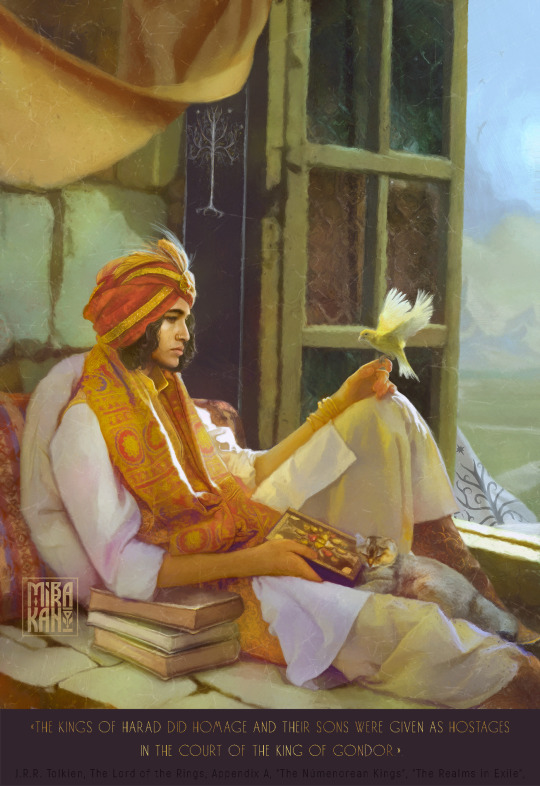
In the 1050 of the Third Age Gondor was at the height of its power and "defeated the Men of the Harad, and their kings were compelled to acknowledge the overlordship of Gondor…the kings of the Harad did homage to Gondor, and their sons lived as hostages in the court of its King."
RotK, Appendix A, I, iv, Gondor and the Heirs of Anarion
✔ Close-up of Haradrim Prince -> click here
#silmarillion#tolkien#tolkien art#artmirka#lord of the rings#lotr#middle earth#haradrim#tolkien fanart#fantasy art#harad#gondor#lotr art#silm art#NO AI!!!!#no ai art
1K notes
·
View notes
Text
People who say that the Rings of Power are political didn't know much about politics in Tolkien's universe.
Don't get me wrong, the story is always good vs evil but reducing the story of the books to that is reductive. What makes this universe interesting even as an adult is the fact that it's actually more complicated than "good vs evil". Just the story of Fëanor that completely breaks this perfect image of elves.
The ROP series could have made very interesting politics (really relevant...) but chose to do things that are not assumed most of the time in addition to being inconsistent with the story. They just complicated things for themselves when everything they needed was right there! Numenor suffers a military coup by Al-Pharazon, discriminates against a religious minority (the faithful) by forcing them into exile in another part of the island, colonizes Middle Earth by forcing populations to move to exploit resources which has repercussions thousands of years later (I'm talking about the forests of Dunland cut down for ships). Hell, they could even use the versions where the Black Numenorians colonize Harad and make human sacrifices there! And especially the repercussions that are still present during the War of the Ring (Sauron and Saruman use the old wound to divide peoples who should be united.)
Ecological morals have always been part of this universe and fantasy in general! But no! The politics in this series are superficial, very specific to America and could have been a thousand times more relevant (But coming from a billionaire company it doesn't really surprise me.)
#the rings of power#lord of the rings#series review#tv series#amazon#tolkien#numenor#harad#haradrim#Dunland#Honestly I'm just bummed about the wasted potential#And a little envious of people who get to enjoy this series#But it gives me an excuse to post about the fandom so it's ok
2 notes
·
View notes
Text
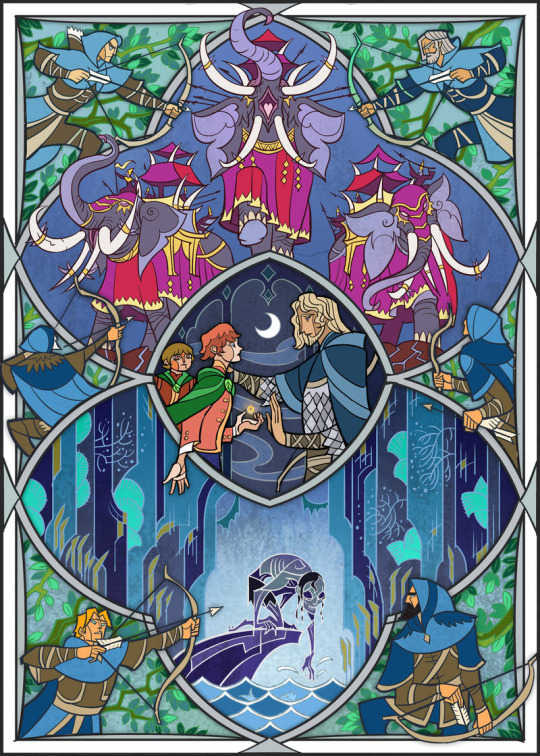
Assurance From Faramir - by Breath Art2004
"But fear no more! I would not take this thing, if it lay by the highway. Not were Minas Tirith falling in ruin and I alone could save her, so, using the weapon of the Dark Lord for her good and my glory. No, I do not wish for such triumphs, Frodo son of Drogo."
#the lord of the rings#the two towers#gollum#faramir#haradrim#oliphant#the forbidden pool#middle earth#tolkien#tolkien legendarium#frodo & sam#frodo baggins
48 notes
·
View notes
Text
In Selih, they tell a legend of a princess-broideress, a hero's mother, who fell into a sleep beyond waking, and he starts when he first hears it, too similar as it is to a different truth. Like as not, it is an echo, perhaps even of things he himself has carelessly revealed somewhere or other, but the likeness of it disquiets him. He stays only a week to earn some coin for a good headscarf and leaves at dawn.
In a village by the Bay of Kenteh, an overjoyed middle-aged woman comes running up to him. It is the thin slip of a girl with dark braids, now greying, the last in a line of foundlings, who had caught the eye of a boy here, when they were passing through thirty years ere. He had stayed a while then, long enough to see her married and safe, but that was so long ago he would not be surprised if she had stopped believing his promise to return one day. I am a man of my word, he says lightly, as if it meant no more than that, and then, feeling pressed to be more honest, though he is as ever speaking in riddles and allusions - I only broke a vow once, but it was not one worth keeping. He tries not to look in the direction of the Sea.
Sarakhir has seen two dynasties risen and overthrown in the century since he last visited, and they say one of the Blue Wizards had been seen in Verna. He curses and heads further south, but he's grown adept at evading Istari by this point.
He does not enter Ekithmar. They brand thieves and murderers on the hand there, and he is a thief and a murderer, many times over, but, all the same, he prefers not to make it known. They have no mark for one who has left it all behind many lifetimes of men ago, he reasons with himself, although be feels guilt for the luxury of being able to choose - where to stay, where to go - places where gloved hands do not rouse suspicion, and he can hide the truth about himself. He makes a wide circle around the city and its lands.
By the Verid they speak in hushed voices, when children are abed, of Khand and even of the land of Mordor, and of the eternal fate of peoples with such neighbours. Young men take down heirloom swords from their places of honour and try the feel of them in their hands. The deret of Sorah levies tax for his army, and so does the king of Dul-im-n'Kar, farther east, but the people on either bank of the river have strong doubts about whom the latter wishes to mount troops against. In rumours he is allied with Uvrath Il-Khand, or even, in the wilder ones, with the Sorcerer.
Maglor partakes in conversation at times, but listens more, though the weight of the truth behind the reports cannot be ascertained, and he has heard talk of Sauron arising every other century. He tests his old skill with a blade, and gives a few lessons to eager youths behind their stables and farmhouses.
Ivratu has killed its king again. From the vange point an immortal walking through a land of mortals has, it does it regularly, every two centuries, give or take one. Why the regularity, Maglor can't say, unless that perhaps everything is easier to repeat when you've done it once. He should know, he laughs ruefully, as if what governs a mob was ever the same as that which governs the decisions of a single man. But if cities have traditions, Ivratu's has at this point become to kill its kings, and its denizens are proud of this bloody history. Maglor suppresses a shudder and carries on
Evralthum does not exist anymore, swallowed up by the Mridyanvan Empire (he walks the ruins of the old royal palace and sings a lament for its laughing princes). The people are still there, scattered in a few jungle villages. It is hard to kill a nation, and they have little love for Mridyanva; so perhaps not all is lost for Evralthum, Jewel of the Veda, whose kings were once his friends. Farther east lie Olonde, Milyan-kai, Ta-L'nau, places he wishes to visit, if only to see how they've changed, but the rumours lying on his mind press him to retrace his steps, back to the Verid. If there is to be war with Mordor in the west, he wishes to be there for it.
There once was a boy he had picked up in Zûnar, a laughing ten year old with copper skin and closely-shorn black hair. And another one, before that, whom he had left in Rivendell after a time - or no, that was further north. In Zûnar they care little for potential war; they've had a dry season and are at the risk of famine. He stays there awhile, to sing some water into the fields in secret, and an early and abundant harvest; having witnessed which, he leaves for the north.
Mild Gondor winter is great relief after a Harad drought, though he needs to acquire a new set of clothing, and the kingdoms-in-exile, Arnor most, but the other too, have always reminded him, in the slightest, of his own people. It comes with sorrow and guilt, and the whispers that follow him here strike too close to the truth, at times, but he has learned not to stay in one town for too long. He earns his keep as a minstrel, and, his song done, keeps vigil in the inns deep into the night, listening to soldiers' talk. Mordor has to be stirring indeed.
He wonders whether to go to Artanis - it is near enough - but as much as he desires to meet his only surviving cousin and hear his mother tongue again, it would mean several months delay, and he has things he might do in the South that he could not do here, conspicuous as he is. Still, it is a pity, if he were to fall at last, for Artanis not to know where, and in one of the taverns there is a kid of the sort that vows they will seek the Golden Wood. He doubts he will be allowed entry even if he goes through with his talk, but it does no harm to give a letter for the astonished boy to carry. In the Pelennor fields, he buys a horse and a sword.
(a companion post) (ao3 link)
15 notes
·
View notes
Text
"Men against Men"
2022
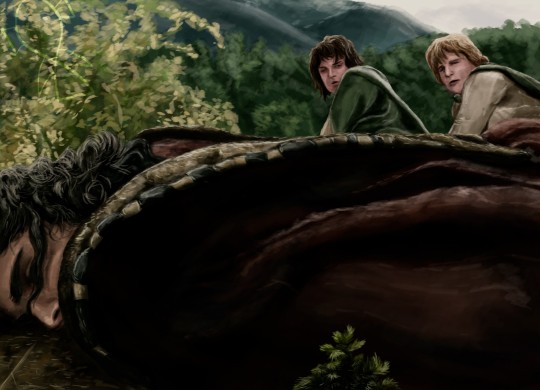
He wondered what the man's name was and where he came from; and if he was really evil of heart, or what lies or threats had led him on the long march from his home; and if he would not really rather have stayed there in peace.
-"The Lord of the Rings: The Two Towers", by J.R.R. Tolkien
A small scene from a small passage, but a very significant one in that it portrays Tolkien's antiwar thoughts. I am glad that in the Extended Edition they give those lines over to Faramir, him being after all not a warrior by choice.
#frodo baggins#sam gamgee#haradrim#ithilien#lord of the rings#lotr#lotr fanart#lotr art#fandom#screencap redraw#photoshop#art#artists on tumblr#mexican artist#autistic artist#dartxo#two towers
14 notes
·
View notes
Text
One of my favourite quests in King's Gondor begins at Halach with Irodon.
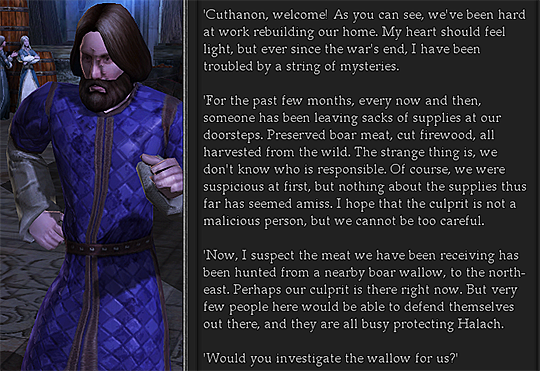
You find this mystery supplier easily, an old soldier of Harad dressed in lordly attire named Asórkho, pouring over some sacks.



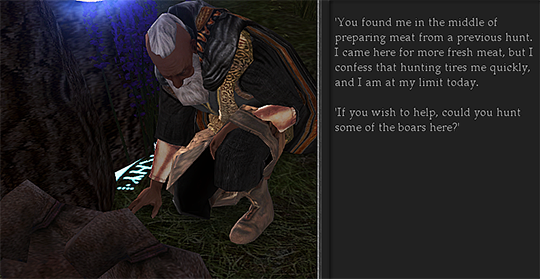

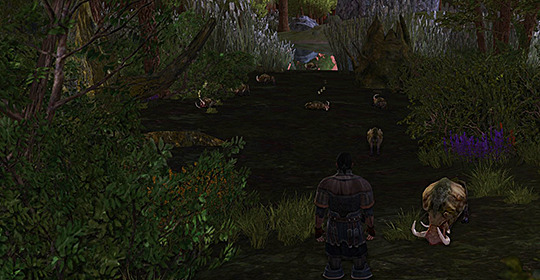
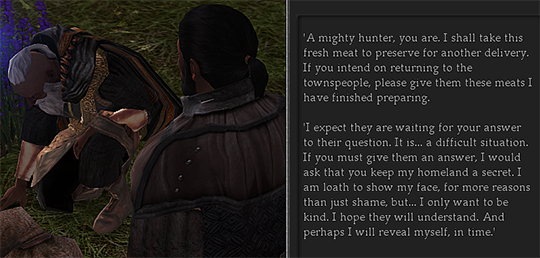

The quest ends here, but on returning to Halach later you find-!

Asórkho in Halach, with he and Irodon in conversation :')
28 notes
·
View notes
Text
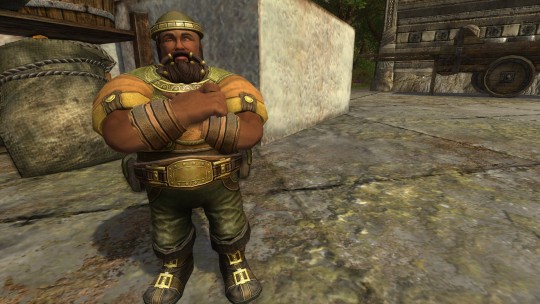

I love the Temámir so much.
I"m not 100% which Tolkien clan they're supposed to be, but they're a different clan from Gimli that lives *vaguely* South.
Potentially in Harad?
They're very Byzantine.
21 notes
·
View notes